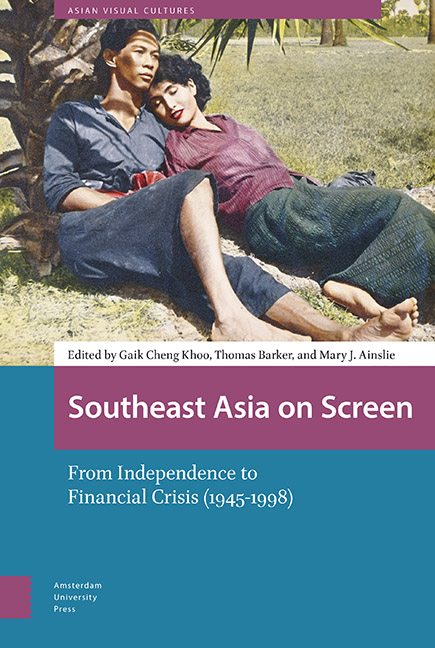Book contents
- Frontmatter
- Contents
- List of Illustrations
- Introduction: Southeast Asia on Screen: From Independence to Financial Crisis (1945–1998)
- Section 1 Independence and Post-World War II Filmmaking: Nation-building, Modernity and Golden Eras
- Section 2 Key Directors
- Section 3 Popular Pleasures
- About the Authors
- Index
6 - Two Auteurs in the Indonesian Cinema of the 1970s and 1980s: Sjuman Djaya and Teguh Karya
Published online by Cambridge University Press: 20 November 2020
- Frontmatter
- Contents
- List of Illustrations
- Introduction: Southeast Asia on Screen: From Independence to Financial Crisis (1945–1998)
- Section 1 Independence and Post-World War II Filmmaking: Nation-building, Modernity and Golden Eras
- Section 2 Key Directors
- Section 3 Popular Pleasures
- About the Authors
- Index
Summary
Abstract
This chapter discusses key films by Sjuman Djaya and Teguh Karya, two Indonesian writer-directors who emerged in the early Suharto era of the 1970s. Sjuman Djaya was trained in the Soviet Union, and on his return to Indonesia made films that engaged – in very spirited and original ways – with the popular culture of the poor and with social issues and Indonesian history. Teguh Karya founded a collective that trained young people in theatre arts but quickly branched into filmmaking. His early films were popular romantic melodramas, which established an audience and created major stars. Later, Teguh made a celebrated historical film, addressed poverty and dislocation in the society, the position of women, and even made one political allegory.
Keywords: popular culture, religion, history, political allegory, Indonesian Cinema
Introduction
In the 1970s and 1980s two writer-directors were particularly prominent in Indonesian cinema: Sjuman Djaya (1933-1985) and Teguh Karya (1937-2001). Both directors received numerous awards at the annual Indonesian Film Festival (FFI); both at times had significant commercial success, but both also saw themselves as primarily artists of the Indonesian cinema, with stories and perceptions they wanted to communicate to their audiences. Both wrote their own screenplays, and both had unique and distinctive ways of working. Sjuman Djaya set up his own production company, Matari Film, with the aim of being in control of his own material, subject though to censorship, including pre-censorship at the script stage, obligatory for much of the Suharto New Order period. Teguh Karya had founded a theatre collective (known as ‘Teater Populer’) and was a theatre director well before he became a director of films. The Teater Populer collective became the centre from which his films were made, with actors in the collective being the main actors in his films.
Rather than attempting to provide complete coverage of all the films written and directed by these two directors (a total of some 28 films, 15 by Sjuman Djaya and 13 by Teguh Karya), this chapter explores major films, and major creative phases in their careers; the sectors of their society and social discourses with which each engaged; and aspects of their relation to the repressive Suharto New Order regime (1967-1998), as well as their resistance to it and to its forms of censorship.
- Type
- Chapter
- Information
- Southeast Asia on ScreenFrom Independence to Financial Crisis (1945–1998), pp. 133 - 152Publisher: Amsterdam University PressPrint publication year: 2020



